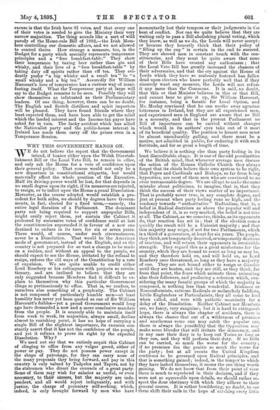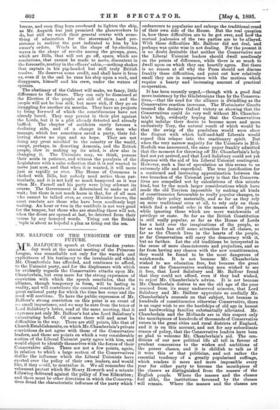WHY THIS GOVERNMENT HANGS ON.
WE do not believe the report that the Government intend, if beaten either upon the Welsh Disestab- lishment Bill or the Local Veto Bill, to remain in office, and only ask the House for a vote of confidence upon their general policy. That course would. not only be a new departure in constitutional etiquette, but would materially affect the whole position of the Executive. Half its driving-power would be lost, for that depends in no small degree upon its right, if its measures are rejected, to resign, or to inflict upon the House a penal Dissolution. Moreover, as the course adopted would establish a pre- cedent for both sides, we should by degrees have Govern- ments, in fact, elected for a fixed term,—namely, the entire legal duration of a Parliament. The dominant party not being required to support unpopular Bills, might easily reject them, yet sustain the Cabinet it preferred by successive votes of confidence until at last the constituencies superseded it in favour of a new one destined to endure in its turn for six or seven years. There would, of course, under such circumstances, never be a Dissolution. That would be the American mode of government, instead. of the English, and as the country is not prepared for so vast a change to be made on a sudden, and without an appeal to the people, we should expect to see the House, irritated by the refusal to resign, enforce the old ways of the Constitution by a vote of expulsion. We are quite unable to credit either Lord Rosebery or his colleagues with projects so revolu- tionary, and are inclined to believe that they are only suggested because Members find it difficult to ex- plain to themselves why this particular Government clings so pertinaciously to office. That is, we confess, to ourselves also something of a perplexity. The Cabinet is not composed of particularly humble men—at least humility has never yet been quoted. as one of Sir William Harcourt's foibles—yet a proud. Government would long ago have demanded a. new and a more conclusive mandate from the people. It is scarcely able to maintain itself from week to week, its majorities, always small, decline almost to vanishing point, it has no hope of carrying a single Bill of the slightest importance, its enemies con- stantly assert that it has not the confidence of the people, and yet it refuses to prove its right by the expected Dissolution. Why ?
We need not say that we entirely acquit this Cabinet of clinging to office from any vulgar greed, either of power or pay. They do not possess power except in the shape of patronage, for they can carry none of the many proposals they bring forward, and pay in this country is only valued by Tadpoles and Tapers, not by the statesmen who direct the counsels of a great party. Some of them may wish for salaries as useful, or even necessary, to their careers, but the majority are inde- pendent, and all would reject indignantly, and with justice, the charge of pecuniary self-seeking, which, indeed, is only brought forward by men who have momentarily lost their tempers or their judgments in Cie heat of conflict. Nor can we quite believe that they are waiting only to pass a Bill abolishing plural voting, which they know, as well as we do, the Lords will never accept ; or because they honestly think that their policy of "filling up the cup" is certain in the end to succeed. They are shrewd men in constant touch with the con- stituencies, and they must be quite aware that none of their Bills have created any enthusiasm ; that the Local Veto Bill has greatly increased. the chances of their adversaries, and that the cry against the House of Lords which they have so zealously fostered has fallen dead upon electors who know perfectly well that if they sincerely want any measure, the Lords will not refuse it any more than the Commons. It is said, no doubt, that this or that Minister believes in this or that Bill, and cannot bear to give it up, Sir William Harcourt, for instance, being a fanatic for Local Option, and Mr. Morley convinced that he can soothe away agrarian bitterness in Ireland, but they are all experienced men, and experienced men in England are aware that no Bill is a necessity, and that in the present Parliament no Bill of importance can be carried without changes which would in its authors' eyes take out of it most of its beneficial quality. The position to honest men must be almost unendurably galling, and there must be a motive, not admitted in public, for enduring it with such fortitude, and for so great a length of time.
We believe it is nothing else than party feeling in its least discreditable shape. It is one of the odd peculiarities of the British mind, that whenever average men discuss the action of the Roman Catholic Church they always forget that its chiefs believe their own system to be right, that Popes and Cardinals and Bishops, so far from being hypocrites, are most of them men who are convinced to an even unreasonable degree. We are all apt to make the same mistake about politicians, to imagine, that is, that they think the success of their views matter of no importance. That is probably never true, in any complete degree, and just at present when party feeling runs so high, and the tendency towards " authoritative " Radicalism, that is, a. belief in Radical doctrines as above the popular will and independent of it, is so very marked, the belief is not true at all. The Cabinet, as we conceive, thinks, as its opponents do, that reaction has set in ; that if the election comes quickly the result will be a Unionist majority ; and that this majority may reign, if not for two Parliaments, which is a third of a generation, at least for six years. The people, they think, are temporarily deceived, or temporarily desirous of inaction, and will return their opponents in irresistible strength. They regard this as a great misfortune for the country, which they are bound to resist as long as may be, and they therefore hold on, and will hold on, as Lord Rosebery once threatened, so long as they have a majority of one. They are not bound either to resign or dissolve until they are beaten, and they are still, as they think, far from that point, the fears which animate them animating also their followers, and producing a cohesion which, con- sidering the many fanatic groups of which the majority is composed, is nothing less than wonderful. Irishmen or Nonconformists, extreme Radicals or melancholy faddists, Little Englanders or Particularists, they all come to heel when called, and. vote with pathetic unanimity for a delay of the Dissolution. Neither Cabinet nor Members are, we fancy, very sanguine ; but it is hard to extinguish hope, there is always the chapter of accidents, there is always the chance that out of a wilderness of promiscs and anathemas some one may catch the popular ear, there is always the possibility that the Opposition may make some blunder that will irritate the democracy, and in any case their duty is to keep out Tories as long as they can, and they will perform their duty. If no Bills can be carried, so much the worse for the country ; if no promises fire the prairie so much the worse for the party ; but at all events the United Kingdom continues to be governed upon Radical principles, and that is something gained ; indeed, in the temper to which they have lashed themselves, it seems the one thing worth gaining. We do not know that from their point of view there is much to reprehend in their decision, and if they were not so squeezable upon details, we should. rather re- spect the dour obstinacy with which they adhere to their general course. It is rather bewildering, no doubt, to see them shift their sails in the hope of catching every little breeze, and even fling boys overboard to lighten the ship, as Mr. Asquith has just promised the glassworkers to do, but still we watch their general course with some- thing of admiration for the steersman's hard per- sistence in seeking the port indicated to him by his owner's orders. Winds in the shape of by-elections, waves in the shape of revolts among the groups, guns, which are Bills, that will not go off, spars, which are resolutions, that cannot be made to move, discontent in the forecastle,mutiny in the officers' cabin,—nothing shakes that captain in his pig-headed but still truly British resolve. He deserves some credit, and shall have it from us, even if in the end he runs his ship upon a rock, and disappears, himself and his crew, under the waters of opinion.
The obstinacy of the Cabinet will make, we fancy, little difference to the future. They can only be dismissed at the Election if the people are sick of them ; and the people will not be less sick, but more sick, if they go on struggling for another six months. They have no projects to bring forward of which the constituencies have not already heard. They may persist in their plot against the Lords, but it is a plot already detected and already baffled. The chapter of accidents rarely favours a declining side, and of a change in the men who manage, which has sometimes saved a party, their fol- lowing shows no sign and no hope. They are not doing any great mischief to the country or the world, except, perhaps, in deserting Armenia, and the British people, slow in making up its mind, is slow also in changing it. The Unionists may, we think, possess their souls in patience, and witness the paralysis of the Legislature with a calm reflection that it is not wanted to move just now, and that when it is wanted, it will move just as rapidly as ever. The House of Commons is choked with Bills, but nobody need notice them par- ticularly, and it is not half so much hampered as it was when Mr. Parnell and his party were lying athwart its course. The Government is determined to make us all wait ; but there is not much harm in that, for of all men who cannot be talked over, as every Minister knows, the most resolute are those who have been needlessly kept waiting. An hour or two in the vestibule is not very good for the temper, but those who are standing there will not, when the doors are opened at last, be deterred from their • lourse by any honeyed words. Tiring out the British _ "tople is about as hopeful a plan as tiring out the sea.







































 Previous page
Previous page